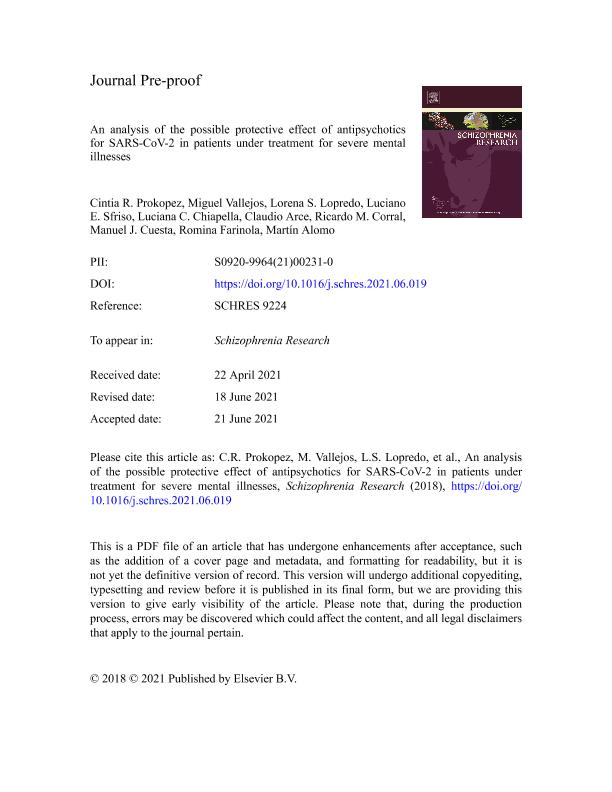Mostrar el registro sencillo del ítem
dc.contributor.author
Prokopez, Cintia R.

dc.contributor.author
Vallejos, Miguel
dc.contributor.author
Lopredo, Lorena S.
dc.contributor.author
Sfriso, Luciano E.
dc.contributor.author
Chiapella, Luciana Carla

dc.contributor.author
Arce, Claudio
dc.contributor.author
Corral, Ricardo M.
dc.contributor.author
Cuesta, Manuel J.
dc.contributor.author
Farinola, Romina
dc.contributor.author
Alomo, Martín
dc.date.available
2022-01-07T21:56:08Z
dc.date.issued
2021-06
dc.identifier.citation
Prokopez, Cintia R.; Vallejos, Miguel; Lopredo, Lorena S.; Sfriso, Luciano E.; Chiapella, Luciana Carla; et al.; An analysis of the possible protective effect of antipsychotics for SARS-CoV-2 in patients under treatment for severe mental illnesses; Elsevier Science; Schizophrenia Research; 233; 6-2021; 99-100
dc.identifier.issn
0920-9964
dc.identifier.uri
http://hdl.handle.net/11336/149839
dc.description.abstract
Since the Severe Acute Respiratory Syndrome coronavirus type 2 (SARS-CoV-2) pandemic has sparked, it was supposed that inpatients with severe mental illnesses (SMI) could be at higher risk of developing the infection, as a consequence of their long stay in closed institutions, adding to the difficulty that SMI entails for compliance with prevention measures, like social distancing or mask wearing. Moreover, people with SMI usually tend to have unhealthy habits, including the use of high amounts of tobacco, a sedentary lifestyle, and an inappropriate diet. These factors, added to the metabolic adverse effects associated with the use of atypical antipsychotics, predispose to respiratory, cardiovascular, and metabolic diseases (Rossler, Salize et al. 2005). It is well known that all these conditions are associated with a severe course of SARS-CoV-2 disease (Chen, Wu et al. 2020, Grasselli, Greco et al. 2020, Zheng, Peng et al. 2020). Since the pandemic started in Argentina, we expected a growing number of infected inpatients among mental health hospitals. To prevent the SARS-CoV-2 spread among patients in closed institutions, a SARS-CoV-2 unit was created to receive all inpatients with a positive test and the absence of symptoms, or the presence of mild symptoms. To our surprise, these units received few patients, and even fewer patients required to be transferred to more complex general hospitals because of the disease severity. These events led us to ask if antipsychotics could have a protective effect on the disease.
dc.format
application/pdf
dc.language.iso
eng
dc.publisher
Elsevier Science

dc.rights
info:eu-repo/semantics/openAccess
dc.rights.uri
https://creativecommons.org/licenses/by-nc-sa/2.5/ar/
dc.subject
SARS-CoV-2
dc.subject
Covid-19
dc.subject
antipsychotics
dc.subject
COVID-19
dc.subject.classification
Psiquiatría

dc.subject.classification
Medicina Clínica

dc.subject.classification
CIENCIAS MÉDICAS Y DE LA SALUD

dc.subject.classification
Enfermedades Infecciosas

dc.subject.classification
Ciencias de la Salud

dc.subject.classification
CIENCIAS MÉDICAS Y DE LA SALUD

dc.title
An analysis of the possible protective effect of antipsychotics for SARS-CoV-2 in patients under treatment for severe mental illnesses
dc.type
info:eu-repo/semantics/article
dc.type
info:ar-repo/semantics/artículo
dc.type
info:eu-repo/semantics/publishedVersion
dc.date.updated
2022-01-06T13:45:32Z
dc.journal.volume
233
dc.journal.pagination
99-100
dc.journal.pais
Países Bajos

dc.journal.ciudad
Amsterdam
dc.description.fil
Fil: Prokopez, Cintia R.. Hospital Neuropsiquiátrico Braulio Aurelio Moyano; Argentina. Universidad de Buenos Aires. Facultad de Medicina. Instituto de Farmacología; Argentina
dc.description.fil
Fil: Vallejos, Miguel. Gobierno de la Ciudad de Buenos Aires. Hospital Municipal "José Tiburcio Borda"; Argentina
dc.description.fil
Fil: Lopredo, Lorena S.. Hospital Neuropsiquiátrico Braulio Aurelio Moyano; Argentina
dc.description.fil
Fil: Sfriso, Luciano E.. Hospital Neuropsiquiátrico Braulio Aurelio Moyano; Argentina
dc.description.fil
Fil: Chiapella, Luciana Carla. Universidad Nacional de Rosario; Argentina. Consejo Nacional de Investigaciones Científicas y Técnicas; Argentina
dc.description.fil
Fil: Arce, Claudio. Hospital Neuropsiquiátrico Braulio Aurelio Moyano; Argentina
dc.description.fil
Fil: Corral, Ricardo M.. Gobierno de la Ciudad de Buenos Aires. Hospital Municipal "José Tiburcio Borda"; Argentina
dc.description.fil
Fil: Cuesta, Manuel J.. Hospital de Navarra; España. Universidad Pública de Navarra; España
dc.description.fil
Fil: Farinola, Romina. Gobierno de la Ciudad de Buenos Aires. Hospital Municipal "José Tiburcio Borda"; Argentina
dc.description.fil
Fil: Alomo, Martín. Hospital Neuropsiquiátrico Braulio Aurelio Moyano; Argentina. Universidad de Buenos Aires; Argentina
dc.journal.title
Schizophrenia Research

dc.relation.alternativeid
info:eu-repo/semantics/altIdentifier/doi/http://dx.doi.org/10.1016/j.schres.2021.06.019
dc.relation.alternativeid
info:eu-repo/semantics/altIdentifier/url/https://www.sciencedirect.com/science/article/pii/S0920996421002310
Archivos asociados
